
testimonials
A Multicultural Student Exchange on Circular Value Chain Strategies
Fontys University of Applied Sciences (Fontys) in Eindhoven is buzzing with excitement as students from six different universities gather to take part in the annual international multidisciplinary week for ICT and business universities. This year’s focus is on circular value chain strategies and how to implement them in a complex business environment with The Blue Connection.
“Working with students from different countries and cultures has been eye-opening.”
“Working with students from different countries and cultures has been eye-opening. It’s helped me see things from a different perspective and approach problem-solving in a new way,” Filipa, a student from Portucalense University
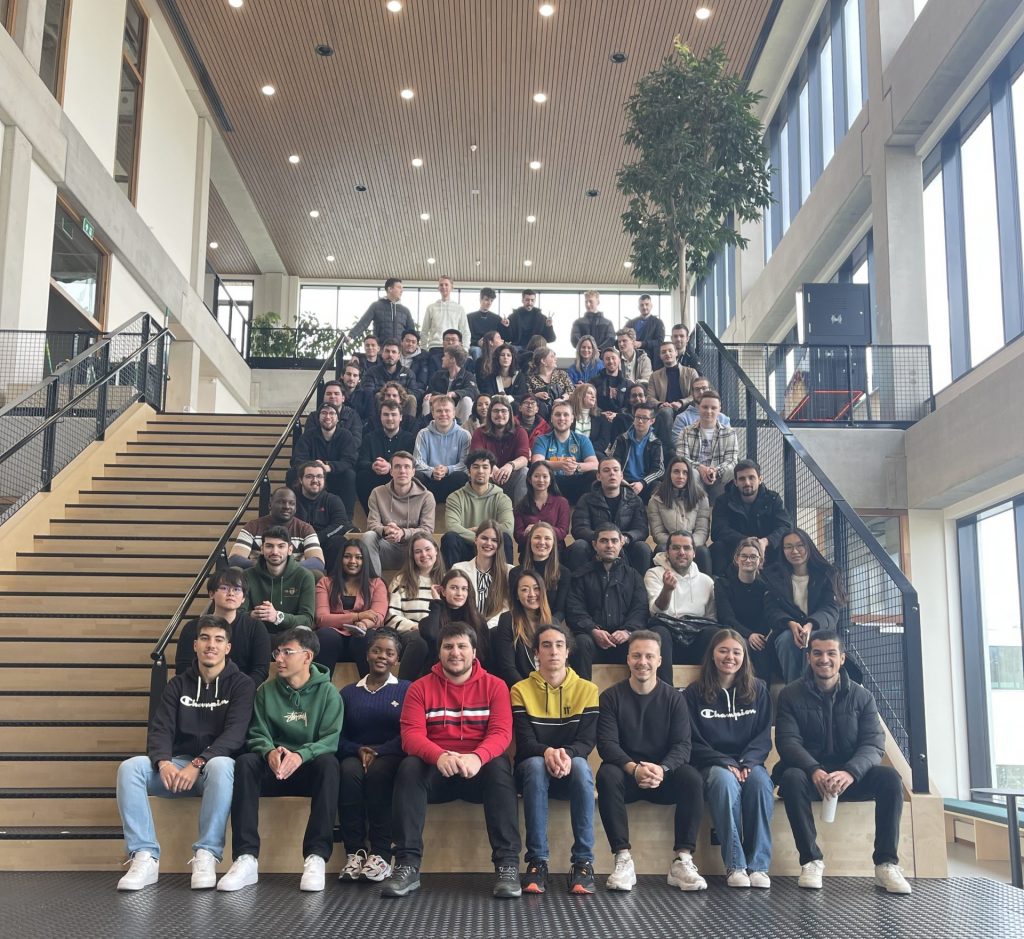
Fontys’s ICT and business students are joined by students from the following universities:
- Portucalense University, Portugal
- Cardiff Metropolitan University, U.K.
- Riga Technical University, Latvia
- Prague University of Economics and Business, Czech Republic
- EPHEC University College, Belgium
Excitement Builds as Multidisciplinary Week Begins
The students are gathered in a large auditorium, chatting, and getting to know their new teammates from different countries. The room is charged with energy and enthusiasm as they prepare to embark on this new learning experience together.
“Meeting my international teammates for the first time was exciting.”
“Meeting my international teammates for the first time was exciting. It felt like I was about to embark on a new adventure,” Filipa, a student from Portucalense University.
The Importance of Strategy in a Business Environment
Petra Janssen, an ICT & Business teacher at Fontys, takes the stage and adjusts the microphone. She has a good idea of what her students are about to experience. She participated in a similar event in the past years, the Global Educator Challenge, which focused on supply chain management. Educator teams from around the world competed for the world trophy.
However, this time is different. Now, Fontys is the host, and it is Petra’s first time using the circular business game, The Blue Connection, the centerpiece of the week-long event. She acknowledges that it can be difficult to imagine since students have little to no experience in the business world.
“I hope that the students will learn how important strategy is. We see that this is difficult to imagine if you have never experienced the business world.” – Petra Janssen
As Petra begins to give instructions, the students settle down, ready to dive into the exciting new challenge ahead.
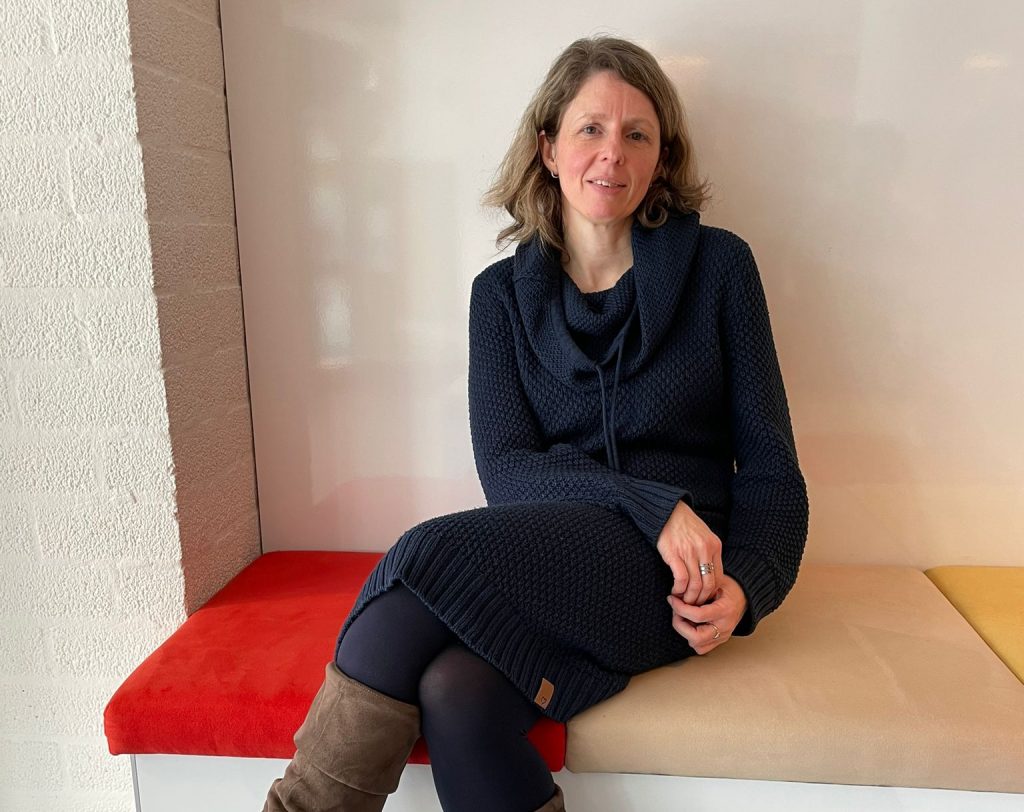
A Unique Learning Experience for Educators and Students Alike
Multiple educators from different universities were excited to assist and observe their students working together while playing the circularity business game.
Mark Madsen, Fontys Project Lead ICT & Business, is thrilled to see students from different countries collaborating and exchanging ideas during the international multidisciplinary week. He believes that the exchange of ideas and experiences is essential for the students to fully understand circular value chain strategies.
“The idea of the week is that they should spend some time intensively on changing ideas and experiences.” – Mark Madsen, Fontys Project Lead ICT & Business
This week, students will be immersed in a virtual environment that simulates real-world scenarios. They will be immersed in a life-like “on-the-job” learning experience that will teach them how to adjust and implement their strategies collaboratively.

“Circularity is a trending topic and a perfect fit. All our teachings at the university have an industry focus. Moreover, we prioritize fostering soft skills to get our students ready for the next step.” Cristian Rodriguez Rivero, Cardiff Metropolitan University
According to the educators, one of the main learning objectives of the multidisciplinary week is the development of essential soft skills. They emphasized the importance of skills such as effective communication, teamwork, problem-solving, and critical thinking, which are crucial for success in any field. These skills are especially important in the context of the circular value chain strategies that the students are learning about.
Educators get to integrate sustainable learning outcomes into their teaching. Students get to think creatively, work collaboratively, and learn in an engaging way. Throughout the multidisciplinary week, both educators and students expect to gain a valuable learning experience.
Lecturers Highlight the Value of Soft Skills and Sustainable Learning
Isabel Seruca and Cristian Rodriguez Rivero, lecturers at Portucalense University and Cardiff Metropolitan University respectively, stated that this was the first time that their students worked in international teams, and they were excited to see the outcome.
“We are committed to working with topics related to sustainable goals.”
“We are committed to working with topics related to sustainable goals. We have to include these goals in the curriculum topics,” says Isabel. Cristian adds that “the complexity of circularity within an organization is a trending topic. The Blue Connection is indeed ideal for our course. We have different kinds of soft skills that we need to improve in our teachings to prepare our students for their next steps.”
“Teaching our students about sustainability is a top priority for us as educators. The Blue Connection is an excellent tool to help us do just that, while also making learning fun and engaging,” says Cristian, a lecturer at Cardiff Metropolitan University.
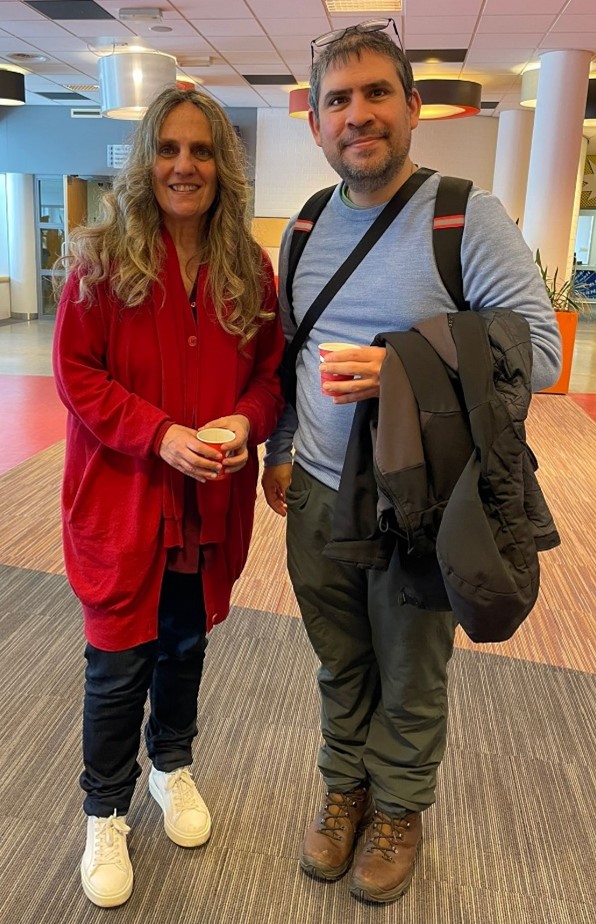
Students Enjoy Learning through Games
During lunchtime, after completing the first part of The Blue Connection, students gather to exchange ideas and reflect on their experiences so far.
Krists, a student from RTU Riga Technical University, shares his positive experience of learning through games. He finds it more practical and engaging than traditional lectures.
“I’ve always found traditional lectures to be a bit boring, but learning through games is much more engaging. It’s like you’re actually in the business, making decisions that have real consequences,” Krists, a student from Riga Technical University
“Interesting experience to learn new skills without the fear of making mistakes.” Callum Langdon from Cardiff Metropolitan University
Callum Langdon from Cardiff Metropolitan University adds, “It’s an interesting experience to learn new skills without the fear of making mistakes.” The students are enjoying this immersive and engaging approach to learning, which allows them to see the importance of strategy in action.
Getting to Know Your International Teammates
Filipa, a student from Porto, shares that she found meeting new people from different countries and cultures to be an incredible experience that taught her a lot about their perspectives and ideas.
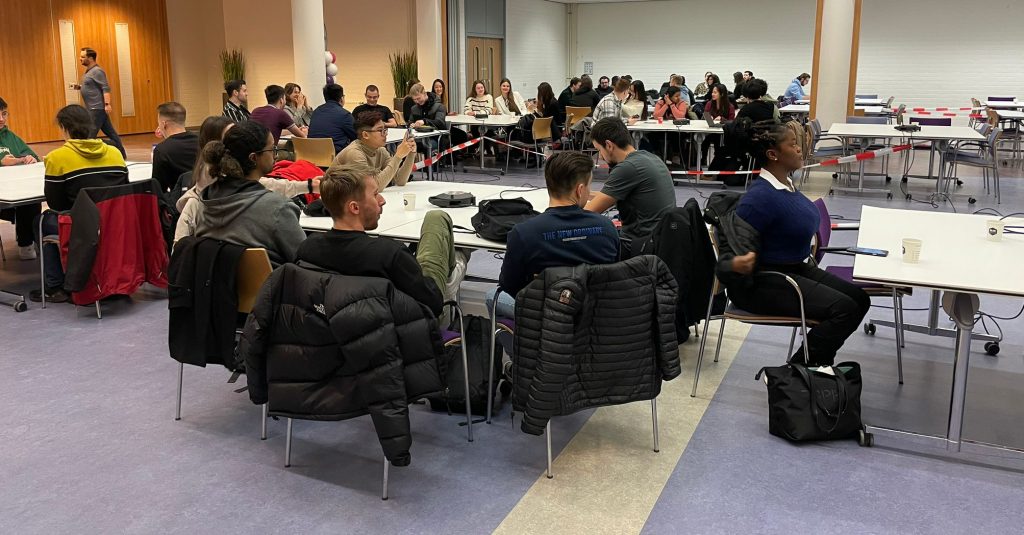
The international multidisciplinary week is not only about learning circular value chain strategies but also about connecting with international students and working together as a team. As the students begin to work through the rounds of The Blue Connection, they get to know their international teammates on a deeper level. At first, it may seem overwhelming, but once they start working together, they quickly realize how much they can learn from each other.
Building Something Important for Society
Marco Hormes, the Business teacher at Fontys, emphasizes the importance of building something significant for society and exchanging ideas with people from different cultures and backgrounds. Through The Blue Connection business game, students learn something new and how to build something essential for society.
“It’s not just collaborating with different cultures, and new people, but also learning something new and how you can build something that’s really important for society” – Marco Hormes
Overall, educators and students are enthusiastic about The Blue Connection, which provides a unique and interactive learning experience that engages students and prepares them to become future leaders who can make a positive impact on the world.
Preparing Future Leaders for the Circular Economy
“We need to equip our students with the skills and knowledge to create a more sustainable future. The circular economy is going to be a big part of that,” says Isabel, a lecturer at the IT department of Portucalense University.
The Blue Connection game is not only teaching the students how to implement circular value chain strategies, but it’s also opening their eyes to the importance of creating a more sustainable future. With the knowledge and skills they are gaining from this experience, they will be better equipped to become future leaders who can make a positive impact on society.
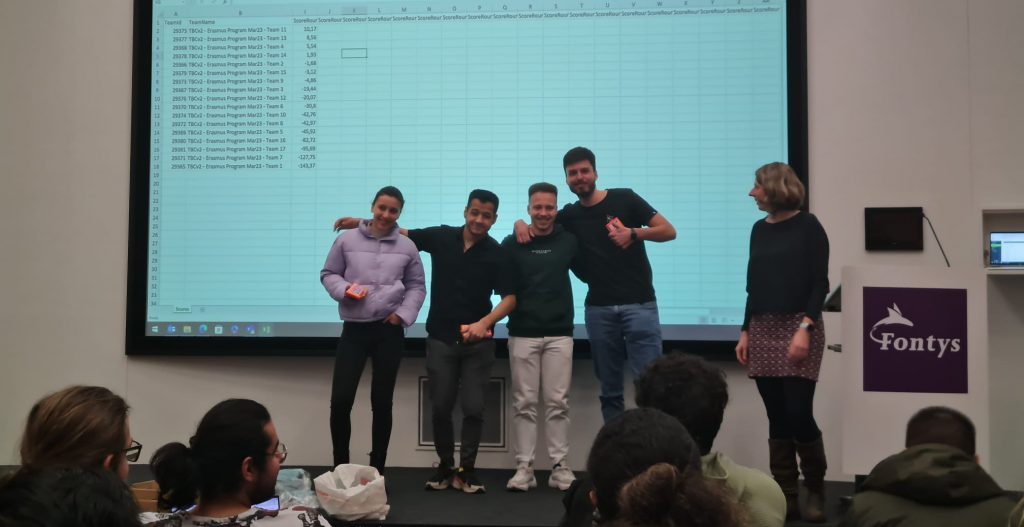
As the world becomes increasingly aware of the importance of sustainability, businesses are looking for ways to adapt to a circular economy. The circular economy model emphasizes the importance of minimizing waste and maximizing the use of resources. This requires a different way of thinking about business and requires leaders who are prepared to navigate this complex landscape. The students who participated in the multidisciplinary week at Fontys University were being prepared to do just that – become future leaders who are equipped to drive change towards a more sustainable future.
Introduce Circular Value Chain Strategies with The Blue Connection
As educators, we’re always on the lookout for innovative ways to engage our students and arm them with real-world skills. The Blue Connection bridges theory with practice, introducing students to the complexities of sustainability and circularity in a business context.
Whether you’re aiming to add a new dimension to your curriculum or thrust students into life-like experiences that echo job market demands, here’s an opportunity that’s both relevant and immersive.
Sign up for a free trial and experience firsthand the transformative power of this educational tool. Or, deepen your understanding with a free Harvard-style teaching case — designed to seamlessly integrate with your course objectives and boost learning outcomes.
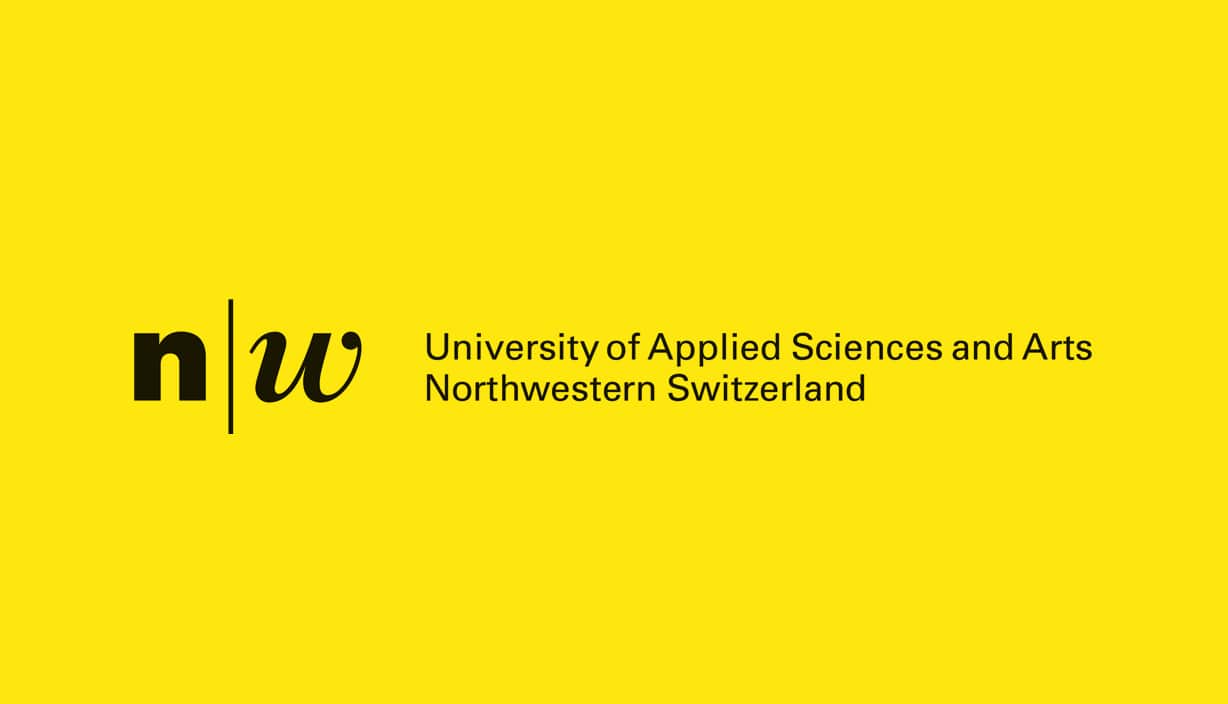
Empowering Students with Real-World Experience
Stephan Verhasselt is a lecturer at FHNW University of Applied Sciences in Switzerland, where he has been teaching for over 10 years. With a background in mechanical engineering and a PhD in supply chain management, Stephan brings a wealth of industry experience to his classes. His goal is to prepare his students for the real world by providing them with hands-on learning experiences.

The essence of supply chain management by Léo Ducrot
Supply chain management is about creating the operating model the company needs to realize its business strategy. It requires to make sure that all the actors of a company are working in the same direction. The Fresh Connection is the perfect tool to understand, experience, and observe the power (and challenges) of alignment. It is a very good learning experience and a lot of fun
